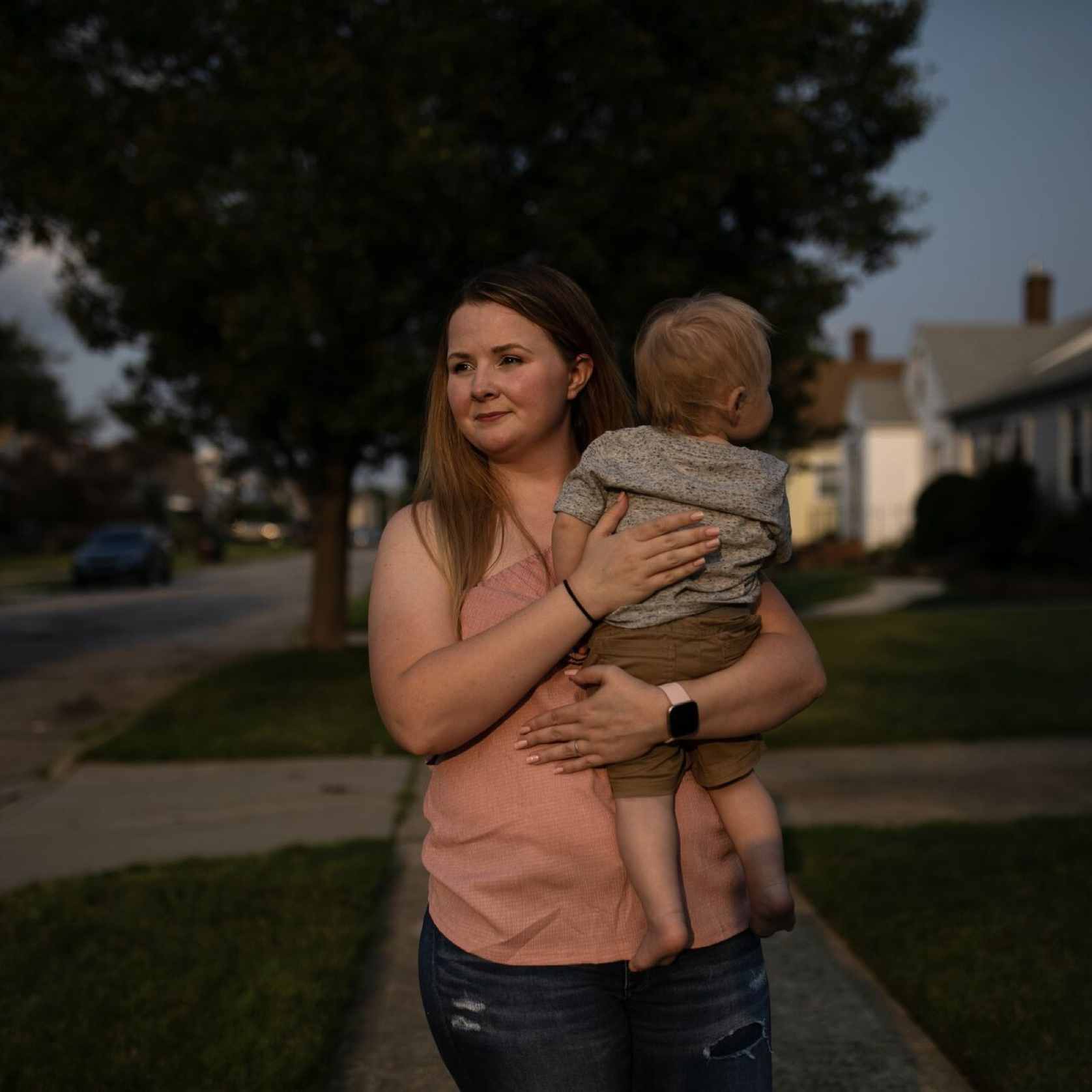One in five mothers in the U.S. suffers from mood and anxiety disorders during pregnancy or soon after birth. For many, help is hard to find.
aclyn Ohmer couldn’t wait to have a baby. Before she was pregnant, she bought onesies and beagle-shaped booties. She and her husband, her high-school sweetheart, found out they were having a son and prepared a Star Wars-themed baby room. The 26-year-old from Parma, Ohio, was ready for his arrival.
Things got harder after he was born in June of last year. Ohmer loved him but she often felt sad. She grew anxious waiting for his next cry. She wasn’t sure she was fit to be a mom.
When he was shrieking one day, Ohmer had a terrifying thought: “If I put my hand over his mouth, he will be gone. He wouldn’t have to live with me, or go through this.”
She became increasingly fearful of hurting her baby—and more convinced that her family would be better off without her. Ohmer tried to seek help, but help was hard to find.
Researchers estimate that one in five new mothers in the U.S. suffers from mood and anxiety disorders during pregnancy and up to a year after giving birth—about 800,000 mothers every year. Yet studies show that a large majority of women who suffer from maternal mental-health disorders aren’t able to get help.
A major cause is the piecemeal nature of the U.S. healthcare system, where no one medical professional takes responsibility for new mothers and their mental health. Obstetricians, usually the first medical point of contact for new mothers, often don’t specialize in it. Pediatricians focus on the children. Many women seeking help go from doctor to doctor, who struggle to find care amid a shortage of mental-health specialists.
“Obstetricians may not take ownership. Pediatricians may not take ownership. Psychiatrists may not take ownership,” said Joy Burkhard, founder of Policy Center for Maternal Mental Health, a nonprofit organization. “All of them are putting the mother to each other, and moms fall through the cracks.”
The U.S. is already the most dangerous place among high-income nations to give birth, with the highest rate of deaths related to pregnancy and childbirth, according to the World Health Organization. The number of women in the U.S. who died during pregnancy or shortly after recently grew to its highest rate since 1965, according to the National Center for Health Statistics, to 33 deaths per 100,000 live births—a number that ranks behind Syria and Uzbekistan.
Last September, the Centers for Disease Control and Prevention said mental-health disorders have become the leading cause of maternal death, contributing to nearly one in four pregnancy-related deaths. These include deaths due to suicide and drug overdose during pregnancy or within a year after birth.
Treatments that have been shown to be effective for maternal mental health, such as psychotherapy, are hard to get. New mothers can also face the stigma of being seen as an unfit parent and have their baby taken away, leaving some reluctant to seek help.
This week, the Food and Drug Administration is expected to announce a decision on zuranolone, the first pill to treat postpartum depression. If approved, the challenge “will be in making sure people can access it. Because that is the piece that new medication does not solve,” said Dr. Nancy Byatt, a perinatal psychiatrist at UMass Chan Medical School.
In the struggle to find treatment, Ohmer was no exception.
Ohmer told her obstetrician at University Hospitals Health System that she often felt sad and anxious. Her OB said those feelings were normal for a new mother, and prescribed her anxiety medication.
Days later, Ohmer called her husband at work in a panic. She was having suicidal thoughts. Her OB sent her to the emergency room.
The ER didn’t admit her because Ohmer didn’t have a specific plan to end her life, according to Ohmer and her family. Instead, they told her to go see her primary care doctor at Cleveland Clinic, who set her up with a social worker. The social worker recommended an outpatient postpartum depression care center not affiliated with Cleveland Clinic. It had a one-year wait list.
Ohmer’s anxiety worsened over the next two months, leading to nightly panic attacks and regular hallucinations. She found herself shuttled between doctors and hospitals. She repeatedly tried to overdose on her anxiety medication. She felt ashamed when an ER nurse suggested she was selfish to have attempted suicide. She was eventually sent for both inpatient and outpatient care at Highland Springs, a general behavioral health facility near Cleveland.
She went for a month, but said she didn’t feel any better. “Nobody in there could relate to her and talk to her about what she was going through,” said Tiffany McBroom, 51, Ohmer’s mother.
University Hospitals, Cleveland Clinic and Highland Springs declined to comment, citing patient privacy.
“The whole time, we’re trusting all these doctors with everyone saying, ‘Oh, yeah, we’re gonna help you,’ but every time it’s been a letdown,” said Nick Ohmer, 25, Ohmer’s husband.
Potential causes
Scientists aren’t sure what causes postpartum depression and associated mood disorders, but one potential cause could be some women’s sensitivity to fluctuating hormones. A recent study from the University of North Carolina School of Medicine suggests inflammation in neural pathways may contribute to the syndrome.
A growing number of Americans have been diagnosed with mental-health disorders, due in part to factors like increased screening and the toll of the pandemic. But therapists are in short supply. The shortage is even worse for those who focus on new mothers, doctors say. A new field called reproductive psychiatry, which focuses on issues related to women and childbearing, remains relatively unknown even among medical professionals.
Across the country, there are only three inpatient care facilities dedicated to maternal mental-health care, according to Postpartum Support International, a nonprofit organization, and nearly 30 more that offer outpatient care.
Brenda Encarnacion, 30, from Santa Clarita, Calif., was voted Most Likely to Know Everyone in high school. She had been working as an extra in movies but became a federal deportation officer because she wanted more financial stability so she could start a family with her husband, Mitchail Encarnacion, 31.
After their baby girl was born in October 2020, some friends said they saw a change in her mood, but thought it was normal stress. “She was hiding it very well,” her father, Miguel Ayala, 57, said.
Mitchail Encarnacion noticed changes after three months when his wife stopped breast-feeding and she returned to work after maxing out her unpaid 12-week family leave. She would start crying while baking a pie or simply because she wore the “wrong pants,” he said.
A trained paramedic, he noticed bruise marks on her legs, and one day saw his wife punching her limbs. He begged her to go see a therapist, he said. She began to see a general therapist once a week but stopped when she didn’t find it helpful.
At each pediatric visit for their daughter, staff routinely asked if she was feeling depressed or had suicidal thoughts, her husband said, but he didn’t feel staff members were really engaging with her. “It was not even like a second, and obviously Brenda’s going to be like, ‘No.’”
One day Brenda told her husband that she felt worthless—a sign that suggested she might be having suicidal thoughts, he said. He tried to convince her to leave her job, but they got into an argument because that would mean losing their health insurance.
The following morning, at around 5 a.m., Mitchail woke up to a text from Brenda. She apologized and cryptically told him she left so he couldn’t stop her, he said. She told him that she loved him, and to make sure their daughter knew she loved her too.
In a panic, Mitchail rushed to the local train station that Brenda used for her commute. Her car was there, engine running, and the door unlocked.
He opened the car door and found his wife inside, dead.
“She shot herself in the heart,” said Brenda’s father, Ayala.
Later that day, a package of hundreds of printed photos, downloaded from Brenda’s phone, arrived at the family’s home, Mitchail said—sent by his wife.
Reasons for suicide are rarely clear or simple. Brenda had kept a lot to herself, said Jeriann Ledner, 32, one of her closest friends. “I have come to terms that she had the disease of postpartum depression, because that is not something that the Brenda we loved would have done,” she said.
Her husband said he’s now living with his parents, who help him take care of their daughter, and thinks every day about how he could have prevented his wife’s suicide. He said he has since been diagnosed with post-traumatic stress disorder, anxiety and severe depression.
Women who attempt suicide typically overdose or cut themselves, both of which can be reversed if caught in time, said Adrienne Griffen, founder of Maternal Mental Health Leadership Alliance, a nonprofit organization focused on health policy. Women who have recently given birth, however, often choose more lethal means of death, including jumping, hanging and shooting. “They are so desperate,” she said.
Higher risk
The U.S. is the only high-income nation in the world that doesn’t have paid maternity leave, according to the nonprofit Bipartisan Policy Center, and an estimated one in four women return to work within two weeks of giving birth. The stress of juggling a job during the physical and emotional changes of new motherhood puts women at higher risk for postpartum depression, studies have found.
The statistics are worse for Black women in the U.S. According to the National Center for Health Statistics, their mortality rate was 2.6 times as much as the rate for white women. Public-health experts have attributed the disparity in part to less access to healthcare, fewer economic and educational opportunities that contribute to maternal health and unintentional bias among healthcare workers.
Studies have found that Black mothers are more likely than white mothers to suffer from maternal mental-health disorders, and less likely to get help. Black women who do seek help are often labeled angry and emotional, said Da’na Langford, co-founder of Village of Healing, an Ohio maternal-health care provider run by Black women.
O nly 5% of psychologists and 6% of psychiatrists are Black, according to industry groups.
Belinda Staley in New York said the stigma and difficulty of getting help had an impact on her sister, Denise Williams, a former supervisor at Costco and a single mother of two young daughters. Williams was “bubbly and could light up the room,” said her sister, adding, “There was nothing Denise wouldn’t do for her babies.”
About a year after her first daughter was born in 2018, Williams began to change, Staley said, secluding herself in her room for hours at a time. Then she started asking, “Am I a great mom?” Staley said.
Williams’ apparent depression grew worse when she was pregnant with her second child, Staley said. At times, she would wander outside at 2 a.m. with her toddler, said Charlene Magee, 50, Williams’ aunt.
In 2021, when Williams was about six months pregnant with her second daughter, she went to a police station across the street seeking help and was sent to a hospital psychiatric ward for two weeks, Staley said.
Putting a woman with a maternal mental-health disorder into a general psychiatric ward is “like offering headache medication to somebody with a stomachache,” said Kallen Thornton, manager of Gender Responsive Services at the Colorado Behavioral Health Administration, a state agency. In addition, she said, “It can damage her identity as a mother and motivation for recovery.”
Williams had her second child a few months later. After she told a drugstore employee she wanted to kill herself and her children, emergency medical services took her to a hospital where she was handcuffed, shackled and labeled a prisoner under arrest in need of medical care, according to medical records. New York’s child protective services took her children, and temporary custody was given to her sister. Williams was discharged three days later.
Ten days later, Williams’ mother called an ambulance because Williams was acting erratically. She died at the hospital two days later, at age 29. The autopsy report said she had died of a pulmonary embolism, a blood clot that travels to the lungs.
Looking back at how Williams was treated, Staley said, “the help wasn’t there for my sister.”
Ohmer finally found help at the University of North Carolina Chapel Hill’s Center for Women’s Mood Disorders, one of the three inpatient facilities in the U.S. for maternal mental health.
While such facilities have existed in other countries for over 60 years, UNC was the first to open specialized inpatient care in the U.S. in 2011, said Dr. Samantha Meltzer-Brody, department chair of the center.
Two weeks after she got in touch with UNC, Ohmer, her husband and her mother drove the nine hours from Ohio to North Carolina. She was told she would stay anywhere between a week and 20 days. “What if the baby forgets who I am?” she wondered.




